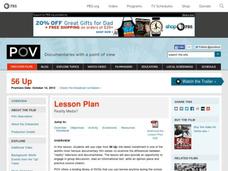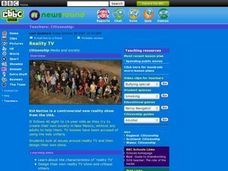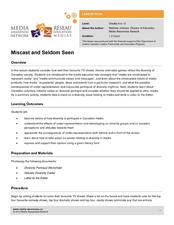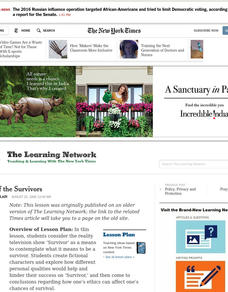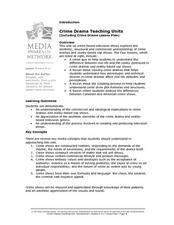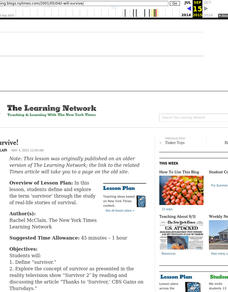Curated OER
Reality Media?
Yeah, but is it real? Clips from the famous documentary film series 56 UP launches an examination of the differences between reality television and documentaries. After considering the characteristics of each format, class members...
Curated OER
What Make Good Reality Television?
Students brainstorm what they believe makes a good reality TV show. Students compile a set of attributes that they feel distinguishes the best of the reality TV shows from the others. Using the attributes that the class agrees determine...
Curated OER
Art Reflecting Life
Have your young television viewers discuss popular shows among their peers. After choosing one show to analyze, middle and high schoolers read about the 2007-2008 network television lineup with the New York Times article "Gauging...
Curated OER
Reality TV
Students examine the merits and dangers of reality television programs. They discuss what kinds of shows they watch on television with a partner, take a survey, read and discuss a handout, calculate the number of hours a week they watch...
Curated OER
Get Real!
Students reach a consensus as to what makes a good reality-based TV show. They create their own scenarios for a new such show, and critique it, based on the criteria the class establishes.
Curated OER
Really Shocking
Students examine statistics about kidney transplants. For this current events lesson, students discuss the premise of the reality television show, "Big Donor Show." Students also discover the functions of the kidneys as well as the...
Curated OER
Miscast and Seldom Seen
Consider how well students' favorite TV shows, movies and video games reflect the diversity of society. The lesson plan introduces your class to several media literacy concepts, such as how media conveys values and messages, as well as...
Curated OER
Fittest of the Survivors
students consider the reality television show 'Survivor' as a means to contemplate what it means to be a survivor. They create fictional characters and explore how different personal qualities would help and hinder their success on...
Curated OER
Survival of the Fittest Microbes
Students explore the harsh conditions of Spain's Rio Tinto River and research the microbes that nonetheless manage to thrive there. They synthesize their knowledge by creating a reality television show set in the Rio Tinto with microbes...
Curated OER
Crime Drama Teaching Units
Investigate the nature of crime dramas on television. What exactly are they trying to portray? Questions and a comparison chart support learners as they watch shows from Canada, Great Britain, and the United States. An oral presentation...
Curated OER
Fearing the Fear Factor
Students write a reaction paper on the topic: "Reality shows like 'Fear Factor' are dangerous/nothing to worry about because...." Students respond to the situation Akron, Ohio's First Energy Corporation being labeled irresponsible after...
Curated OER
Your Politician: Myth vs. Reality
Young scholars adopt a public official, research how they spend their time, and define the actual duties associated with the job. They sort perceptions about the job into myths and realities, and analyze political cartoons involving...
Curated OER
Destination UK: Scotland
Students explore the country of Scotland. They brainstorm what they know about Scotland and draw a mind map of their ideas. They explore the Gaelic language and read about living in Scotland. They discuss a reality television show and...
Curated OER
The Electric Hearth
Students examine popular media. In this media awareness lesson, students keep logs of their interactions with media and then write an essay regarding the data.
Curated OER
The Texas Cowboy: Myth and Reality
Learners create "cowboy ballads" in this interactive, multi-day instructional activity. The cowboy is researched using various sources and class discussions. Students evaluate individual work at the end of the instructional activity.
Curated OER
Shellfish Shenanigans
Twelfth graders create simulations of a reality-based TV show that investigates the near death of a contestant from a seafood meal. They examine the physical symptoms of anaphylactic shock, and create protein fingerprints.
Curated OER
Frontier Life Story
Students undertake a similar (but not quite as drastic) adventure as that of Frontier House as they explore the day-to-day realities of frontier life through a Laura Ingalls Wilder story, and reflect on which time period suits them...
Curated OER
Fair Judgment
Learners consider the demands of the judicial process and work in small groups to write editorials in response to the one that is read in class. For homework, they grade a television judge and write reflective essays.
Curated OER
Self-Image: The Fantasy, The Reality
Students examine the issue of body image and the media. They watch and discuss a video, identify ads with unrealistic images, write a letter to the magazine, develop a timeline of changing body types, and conduct research.
Curated OER
I Will Survive!
Students define and explore the term "survivor" through the study of real-life stories of survival. They interview a person whom he/she considers to be a survivor, and share their interviews with the class.
Curated OER
Tax Jeopardy
Create a glossary of tax-related vocabulary and clip New York Times articles that present tax procedure in action, in preparation for participating in a tax quiz bowl. Young economists explore allegations that "Survivor" Richard Hatch...
Time Warp Trio
See You Later, Gladiator!
Young historians take a look at the age of gladiators, and the cultural atmosphere present when they staged their epic battles. Pupils pretend to be reporters and write newspaper articles about one of the events they stage. Then,...
Curated OER
Etiquette Lessons for Students
Students explore the meaning of good manners and proper etiquette. For this behavior lesson, students read an article that explains manners in the social setting and workplace, then complete several activities that reinforce the...
Curated OER
Parenting in the Movies:Examining Responsibilities in Modern American Films
Students use films to identify the characteristics of a good parent. In groups, they research the different types of parenting methods used during colonial times, the Civil War and the Civil Rights movement. As a class, they develop...
